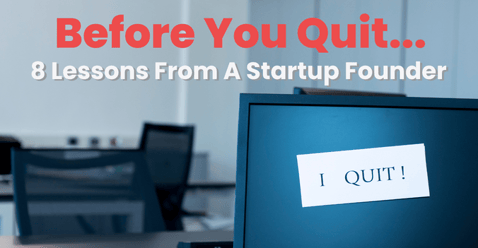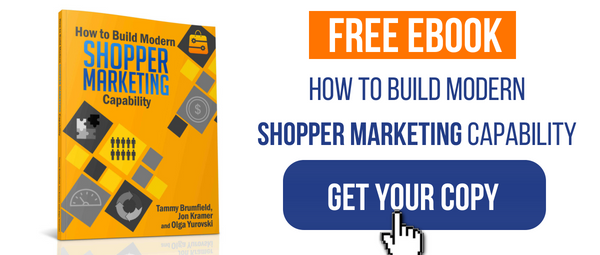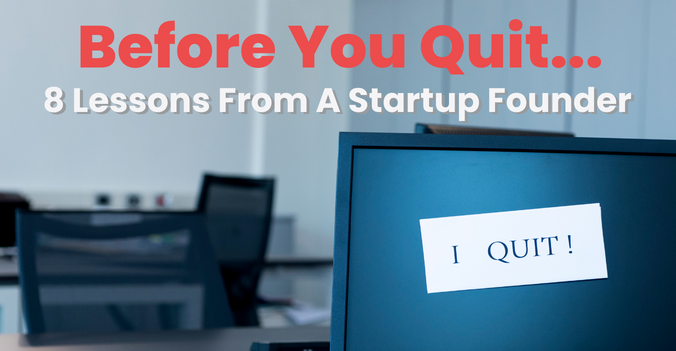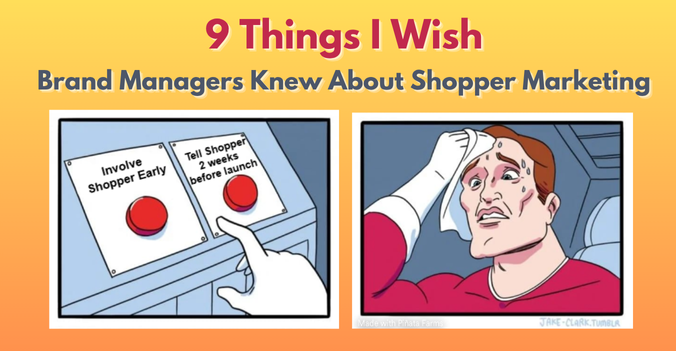
Almost nine years ago, I left my cushy career in CPG marketing to start a tech company. I quit "cold turkey", without any premeditation, a business plan, or a clear idea of how to move forward. On top of that, I had never run a business, had no technical skills, no female tech founder role models to look up to, and no mentors or VC connections to lean on for advice or financing. Looking back at that decision, I think my naivete was a blessing of sorts. If I knew then how hard it was going to be, I probably wouldn't have even bothered to try. But then, maybe I still would have, because I had something to prove to myself and the world.
The odds were stacked against Shopperatons because most startups never survive past year one, but somehow, things worked out for me. So, I thought I would write this article to share my observations and lessons learned in hopes that they inspire some of my readers to pursue their dreams of working for themselves but to do it in a more prepared way than I did. Or, perhaps this post will convince you that the grass is always greener elsewhere, so you can stop that itch and refocus on your corporate career.
1. Make sure you solve a real problem
Just because you are passionate about something doesn't mean it can be a profitable business. Most businesses that fail do so because there was no market need. Do your market research, create prototypes, and get the idea in front of as many future clients as possible. Take feedback, iterate your prototype, and launch crowdfunding campaigns to polish the messaging and to understand who the future paying customers will be. Thanks to the global supply chain, the affordable talent pool that never sleeps, and the user-friendly digital tools, all this can be done at night and on weekends, before you quit your 9-5 career.
2. Solo founders do succeed
Do you need a co-founder or a business partner? Many people feel they do because entrepreneurship is such a lonely endeavor. Or, because they feel they lack skills in a key area. I thought so, too, and was on the lookout for a technical co-founder for quite some time. While I was doing that, I kept working with freelance programmers who I hired to build the initial software prototypes. At some point, I realized that I was close to making a large B2B sale, while my development partners were perfectly capable of delivering the product without taking a risk of becoming a co-founder. I still believe that finding the right business partner could be life-changing, I just didn't have the patience to keep looking.
3. Your life partner's support is vital
Starting a company is a very stressful endeavor. It can be ten times more stressful if your life partner is not on the same page with you. Unfortunately, I don't have a recipe for how to get your partner to embrace your startup ideas. Luckily for me, my husband was very supportive from day one. It helps if your partner has a corporate job with health insurance and a stable paycheck while you are taking risks. Being open and transparent with your partner about your business' financial needs, go-to-market strategy, progress, roadblocks, and wins will be very important. Think of your life partner as your biggest investor or shareholder. After all, they are funding your lifestyle and making great personal sacrifices while you are pursuing your dream.
4. You will need new friends
As you embark on your entrepreneurial journey, you may find it difficult to relate to your old friends. Especially in the early years when you're working insane hours and focused on proving yourself to the world. Your old friends may find it challenging to be around you since all you want to talk about are new growth hacks, inspiring startups, conferences, and networking. By lucky chance, I stumbled upon a new group of friends when a startup incubator introduced me to other local female startup founders via a mass email. One of them proposed setting up a live meet, and from there, six of us started meeting regularly. Those women whom I met for several years became a crucial part of my emotional support system. Not only did I learn all the business tricks my peers discovered, but I also felt I had found my tribe, and that we were on the same wavelength. Another way for entrepreneurs to find camaraderie is to join mastermind groups where they can meet fellow entrepreneurs in their industry or geographic region.
5. Writing and vlogging are skills that can take you far
As a marketer, I always knew that great content is vital for establishing a successful business, but I never thought I qualified as a copywriter or a video content producer. However, with a shoestring marketing budget, I had to learn how to do it myself. I quickly realized that I hated myself on camera, so I decided to focus on writing instead. It took me a while to gain confidence. First, I tried hiring ghostwriters, but they were not domain experts, and their writing felt shallow. Then I hired editors who polished my texts. Finally, I realized that my authentic, unpolished voice was what my readers appreciated the most, and I stopped outsourcing even the editing work. Good writing is not only essential to effectively communicate with clients and business partners but also helps you build a brand for yourself and opens more doors (see the next point) as you drift away from the safety of the corporate mainland into the rough waters of entrepreneurship.
6. You will no longer be able to easily open doors
A rude awakening of sorts hits everyone who leaves a large corporation. It used to be so easy to get a meeting with a vendor or another industry peer when your business card carried a logo of a big corporation. Now that you are on your own, your old Rolodex is suddenly a lot less potent. People you used to share beers with after work no longer pick up the phone. Vendors who used to beg for a meeting with you ghost you now. It's logical, but it still hurts. To avoid finding yourself in this situation, build your own brand that is unrelated to your current employer. If you like writing, start a blog. If you are great at teaching, mentor youngsters in your industry. Build a following, so that when you are ready to fly on your own, you have an audience that already respects you regardless of which logo your business card carries.
7. Raise money when you don't need it. Or better yet, don't raise, just sell
"When you need money, ask for advice, when you need advice, ask for money." - This is well-known wisdom in the startup world. I was initially obsessed with raising VC money because it seemed as if everyone in our local startup ecosystem was doing it. I got frustrated explaining to potential investors why my niche market (CPG shopper marketing) needed automation software. The problem was that nobody had heard of shopper marketing, and the plight of shopper marketers was hard for them to relate to. Selling, on the other hand, was a lot more rewarding. Every time I had a demo meeting with potential clients, I felt validated. I felt I was making a difference for them and making tangible inroads for my business. It took just a couple of major deals for me to realize: I don't need to raise money and give away equity! I can now spend all that time serving our clients, improving the product, and ensuring renewals. When potential investors come to me now, the power dynamic is entirely different compared to what it was in the past.
8. Tenacity, irrational belief, and maniacal pursuit will become your strengths
You will have to unlearn some behaviors you learned in the corporate world. There, you did not want to come across as someone who is obsessed and stubborn. In an early-stage business, skeptics will be abundant. Your friends and family will think you lost your mind, your former colleagues will root for you to fail, and 'experts' will tell you there is no market for what you sell, but you must proceed because you've done your homework (see step one). One of the mentors I had early on said that "maniacal belief" was a requirement for successful entrepreneurs because it sustained them through tough times. I can now vouch that it's true.
Are any of these lessons surprising to you? Did you get inspired to go forward with your business ideas after reading this? Or perhaps the opposite - you realized that you have to cherish the career you have? Maybe you have a business already and can add more ideas to this list? Please share in the comments or drop me a line at olga@shopperations.com.











